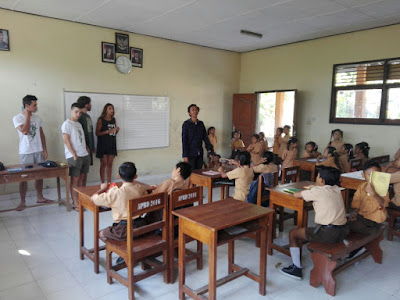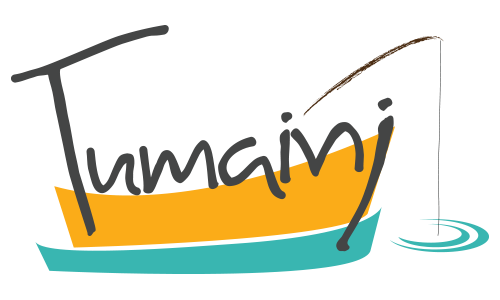Family volunteering in Indonesia: "It has been great as a mother, partner, traveller and volunteer!
 |
| Reyes and his children in the Nusa Penida. |
This summer, Reyes travelled with her two sons, aged 21 and 22, to Indonesia. They collaborated on a project that aims to recuring and protecting the natural environment of the island of Nusa Penida. The experience has helped her to "sow a seed of solidarity" in her children and to get to know each other better, share incredible experiences and make unforgettable friendships.
This was the first trip to a faraway place that you have made as a family. How did the idea come about?
Because of my concern for continue to do our bit to improve the world. I also wanted to instil this idea in my children.
 |
| Reyes, their children, other volunteers and people from the project in Nusa Penida. |
Do you think that a solidarity trip is a good experience for the whole family?
It seemed that way to me, because of a lot of things! In general, we have met ourselves in very different circumstances than usual. As a mother, it gives me the satisfaction of continuing to sow in the formation of two people who can continue the baton. As a companion, because it has given us the opportunity to enjoy together and strengthen our bonds. As a traveller, because it has been fantastic to get to know another culture and other human and geographical landscapes and expand relationships with other volunteers, we have left friends from different places and the three of us have done it together! They will be common friends united by a beautiful experience. And as a volunteer, because when it happens, no matter how little, in the company of your loved ones, it seems to you that it is done with more strength.
 |
| During the travel They were also able to go on excursions with other volunteers. |
What was a day in the project like?
At seven o'clock sharp we started the meeting of volunteers. Our coordinator, Cucu, an endearing guy, told us what the proposed activity for the day was. It could be: monitoring an endangered bird species called Bali Starlingi.e. sighting the influx of these birds in nests placed in different areas; weed landscaped areas of the project; transplanting cuttings o search for a particular species of tea plant in the jungle around the project and then plant it for cultivation.
After breakfast, it was time for an excursion! We rented a couple of small motorbikes that allowed us to move around with a certain degree of autonomy, although not without some risk, especially the way from the project to the more or less asphalted road area. The first day we went alone, but for the rest of the trip we were on our own. we organised the excursions with the other volunteers. The beauty of the island's nature goes without saying.
Lunch was usually taken at the place of the day's excursion, and we would join the second activity at around three or four o'clock, which also varied! On a couple of occasions, we went to schools to give English classes to boys and girls. Other times, we picked up rubbish from a beach or even visited an impressive cave, albeit full of bats, hahaha!
Once back from the activity, we had time for a rest and a shower and before seven o'clock, dinner, which we used to have there all together, with after-dinner chat and even a bit of guitar or card playing. One day we ventured down after dinner (it gets dark there at half past six) to a nearby bar to listen to live music, even with some participation on our part 🙂 And, of course, there we met local people.
 |
| The classes with children were the most rewarding experiences. |
Can you tell us any special anecdotes from your solidarity trip?
The shock I got the first time I heard a gecko (and it was at night)! You don't know what kind of bug I could imagine that made those soundsAnd what was my surprise when I was told that it was a lizard like our geckos, which also ate mosquitoes... in the end they were welcome and everything!
And the most gratifying thing, at least for me, the children at school, what a party it was for them to have us there!
How is your relationship with the people in the project?
Cucu, the coordinator, was great! It lent itself to all our jokes! We got on so well with him and the girls in charge of the kitchen, Asti and Ekha, that without speaking English we were laughing our heads off and ended up sharing, and getting to know a bit of their lives.
 |
| The volunteer tasks were very varied. |
In the project, did you all work together?
Generally yes, but sometimes we were divided into small groups. For example, to cover all the bird's nest spots, or in English classes depending on the level.
What did you like most and least about your experience?
The most important thing, and in summary of all the experiences, sharing it with my children. The least, sometimes feeling helpless in the face of the situation. For example, with the rubbish, you felt like hiring a lorry or something, with a shovel, and stay there to organise a service.
 |
| The landscape of Nusa Penida is spectacular. |
What have you learned?
A tolerate other culturestrying not to pass judgement. For example, it is difficult to understand the state of slovenliness in terms of the rubbish you find all over the island, whether inland or on the beaches, to understand their laxity in other matters compared to our rhythm, to understand that they are not as relaxed as we are, to understand that they are not as relaxed as we are. you can live happily with very littleWherever you went to say hello, there was always a smile and a friendly face. In addition, sou always get more than you giveYou don't need to know languages to connect, and you can travel in a different way, perhaps with less involvement than I would have liked in solidarity issues, but it is also true that travelling so far away is worth the tourism, and it is appreciated for the contribution of experiences.
Reyes and his children travelled together with Tumaini to Nusa Penida from 6 to 15 July 2018.



